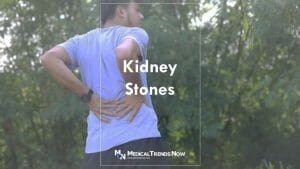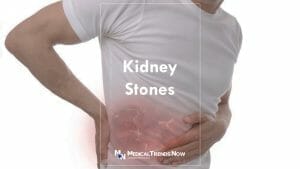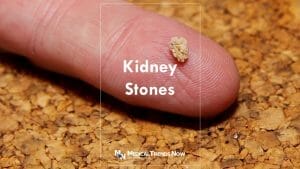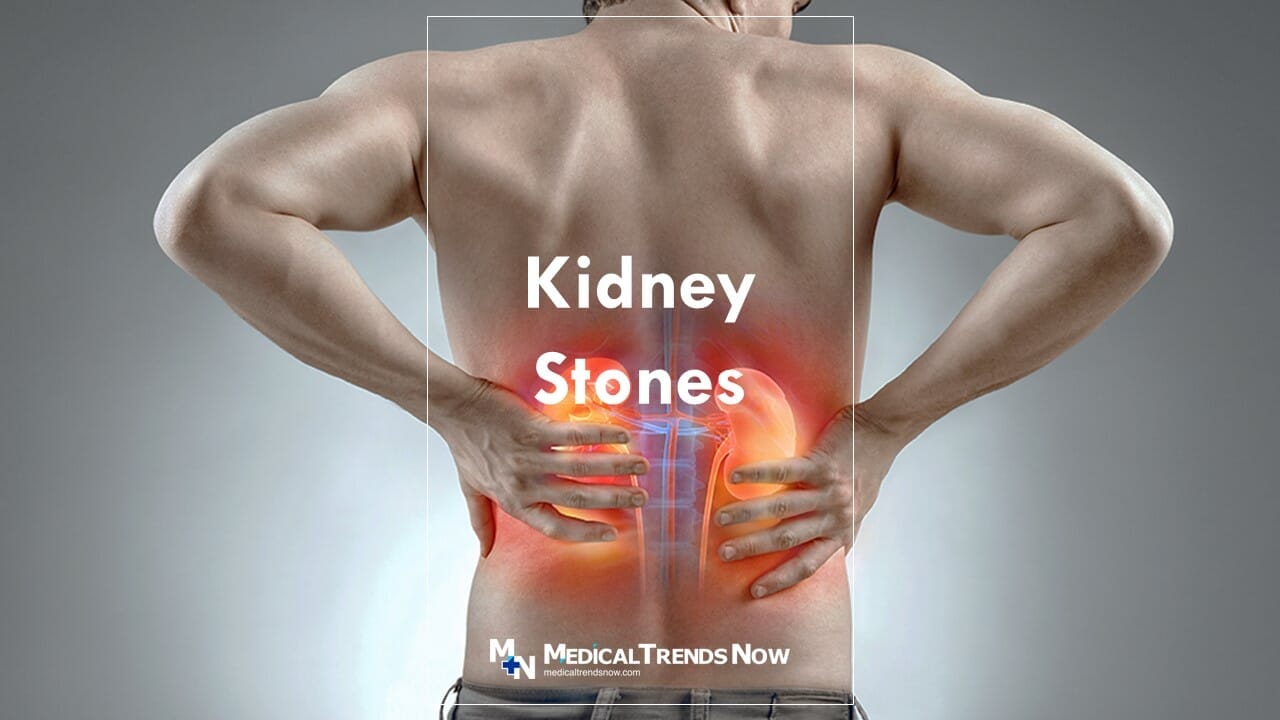Table of Contents
Kidney stones (also called renal calculi, nephrolithiasis, or urolithiasis) are a common health issue, causing pain and discomfort for far too many Filipinos. Up to 2% of the Philippine population will experience kidney stones at some point in their lives, and the causes of the condition can be varied and complex. This article will explore the typical causes of kidney stones among Filipinos, focusing on lifestyle factors that may increase risk. We will also discuss reducing your chances of developing kidney stones by changing your diet and habits. High uric acid and calcium crystals forming in urine can cause kidney stones. The signs are excruciating pain.
What are Kidney Stones?
Kidney stones are one of the most painful urological conditions, causing excruciating pain in the lower back and abdomen. These small, hard deposits consist of minerals and acid salts that collect inside the kidneys. While they can be incredibly painful to pass, there is hope for those affected by this condition as it can often be prevented with lifestyle changes or treated medically.
Kidney stones form when certain substances in urine become too concentrated and form crystals around a nucleus. When these tiny crystals grow bigger over time, they eventually form a stone-like object from 5mm-2cm in size. Many Filipinos who experience kidney stones may describe the pain as a sharp or burning sensation near their ribs on either side of their body, depending on where the kidney stone is located. Other symptoms may include nausea, vomiting, frequent urge to urinate, or blood in your urine.

Types of Kidney Stones
Kidney stones are a common disorder that affects nearly 10% of the population. They can be extremely painful and lead to serious health concerns if not treated properly. Kidney stones form when minerals in urine build up, crystallize and stick together. There are four main types of kidney stones:
- calcium
- struvite
- uric acid
- cystine kidney stones
Calcium kidney stones are the most common type of stone, accounting for 75 percent of all cases. Calcium kidney stones are a painful and serious medical condition that affects the urinary tract. These small stones form when there is an excess of calcium in the body and can cause unbearable pain when they move around inside the kidneys. Filipinos with calcium kidney stones may experience extreme discomfort, nausea, or other uncomfortable symptoms that can be difficult to manage.
This condition is not uncommon, as it affects up to 10% of Filipinos throughout their lifetime. Those with a family history of kidney stones or those taking certain medications for other conditions are more likely to develop this issue. Fortunately, you can take steps to reduce your risk of developing these painful stones, including drinking enough water each day and avoiding foods high in sodium and animal proteins. Additionally, plenty of exercise can help reduce your risk factors for developing these types of kidney stones.
Struvite stones are a type of kidney stone that is composed of magnesium, ammonium, and phosphate. They occur in approximately 15-20 percent of all kidney stone cases and can cause painful symptoms and even lead to infection if left untreated. Struvite stones are most commonly found in women, especially those who have urinary tract infections caused by bacteria that produce urease enzymes. These bacteria break down proteins into ammonia, combining with the minerals that form struvite stones.
If left untreated, struvite stones can grow very large and block the passage of urine from the kidneys to the bladder, leading to severe pain and an increased risk of infection throughout the urinary tract system. Treatment for these stones typically includes antibiotics to eliminate bacterial infection and medications to reduce acidity levels in the urine, which may help prevent further stone formation.
Uric acid stones are a type of kidney stone that is formed when uric acid levels in the body become too high. Uric acid is a waste product that is produced when our bodies break down purines, which are found in certain foods and drinks. High uric acid levels can be caused by conditions such as gout or kidney disease, but an unhealthy diet can also cause it with an excessive intake of animal proteins. Uric acid stones look like yellow or brown crystals and are often associated with burning sensations and pain during urination.
The symptoms associated with having a uric acid stone include pain in the back or side near the kidneys, nausea, vomiting, blood in the urine, and difficulty passing urine due to blockage from the stone.
Cystine kidney stones are a rare but serious medical condition that can present a significant challenge to those affected. These calcium-based stones form due to an inherited metabolic disorder called cystinuria, where the body cannot process and excrete certain organic compounds effectively. As these substances accumulate in the kidneys, they form hard masses that can cause pain and potentially block the urinary tract.
Those suffering from cystine kidney stones may experience symptoms such as severe abdominal pain, nausea, vomiting, and frequent urination. In more extreme cases, the stones may become large enough to pass through ureters and enter the bladder or other areas of the urinary system. If this happens, surgery may be necessary to remove them safely.

What are the Causes of Kidney Stones Among Filipinos?
Kidney stones are a painful and common condition affecting thousands of Filipinos yearly. There are several factors that can contribute to an individual’s likelihood of developing kidney stones. Knowing the causes and risk factors associated with kidney stones can help individuals take preventative measures to avoid them.
The most common cause of kidney stones is insufficient water or other fluids. When insufficient liquid is in the body, the urine’s minerals become concentrated and form crystals, forming small hard clumps known as kidney stones. Other risk factors that increase an individual’s likelihood of developing a stone include certain medications such as diuretics or laxatives, underlying medical conditions like gout or urinary tract infections, a diet high in protein and sodium, obesity, dehydration due to strenuous exercise or hot weather, family history of kidney stones and advancing age.

How are Kidney Stones Formed?
Kidney stones form when minerals and other substances that are normally found in urine build up and form tiny crystals. These crystals can grow into larger masses, making them difficult to pass through the kidneys, bladder, or ureter. It is estimated that over 2 percent of the adult population in the Phillippines will experience kidney stone formation at some point in their lives. According to the Philippine Senate inquiry with the Department of Health, approximately two million Filipinos have kidney stones without knowing it.
The exact cause of kidney stones is not always known, but there are certain factors that can contribute to their formation. Dehydration increases the chance of kidney stones since it causes the body to produce more concentrated urine with a higher mineral content. A diet high in salt or animal protein may also increase the risk of stone formation as these foods increase uric acid levels in the body, which can lead to crystallization.

Symptoms: Warning Signs of Kidney Stones Among Filipinos
While kidney stones may not always cause symptoms, many Filipinos experience warning signs of something wrong.
Common warning signs of kidney stones include :
- severe pain in the side or lower back
- abdominal pain that may come and go
- nausea and vomiting
- blood in the urine
- fever or chills
- difficulty urinating or cloudy urine.
Pain caused by kidney stones can be excruciatingly sharp at times, so it is important to pay attention to any changes in your normal health status that could indicate their presence. Other tell-tale symptoms include a burning sensation when urinating or a frequent urge to pee, even though only small amounts are passed each time you go.

Diagnosis of Kidney Stones
Kidney stones are a common yet painful disorder affecting many Filipinos. They occur when small crystals of calcium or other chemicals form in the urinary tract and can cause severe pain, nausea, and vomiting. Knowing how to diagnose and treat kidney stones is important for those who experience them.
Medical professionals use a variety of methods to diagnose kidney stones. Most commonly, imaging techniques such as X-rays, CT scans, and ultrasounds are used to detect the location, size, shape, and number of kidney stones. In some cases, doctors in the Philippines may also perform blood tests or use specialized equipment such as an IVP (intravenous pyelogram) to locate any stones that may be present. Urine tests may also be conducted to look for any excess minerals that could lead to stone formation.

Treatments of Kidney Stones in the Philippines
Kidney stones are a common problem for many Filipinos. These hard deposits of minerals and salts form in the kidneys and can cause serious pain when they pass through the urinary tract. While kidney stones can be incredibly painful, treatments can help reduce pain and prevent them from forming.
The best way to treat kidney stones depends on their size and type. Smaller stones may be able to pass naturally with enough fluids, over-the-counter pain relievers and medications to relax and widen the ureter so that stone can pass more easily, medications to block nerve impulses to reduce pain levels as well as antibiotics for any possible infections related to the presence of stones. Suppose the stone is too big to pass naturally. In that case, it may need to be broken up using shock wave lithotripsy or removed through surgery or minimally invasive procedures such as ureteroscopy or percutaneous nephrolithotomy (PCNL). In some cases, medication may also be prescribed to help relieve symptoms, reduce the stone size and prevent new ones from forming.

Prevention Strategies: Avoid Getting Kidney Stones
Kidney stones can be an incredibly painful condition that can occur when calcium, oxalate, and phosphorus form together in the kidneys. There are some important steps to take to prevent kidney stones from forming.
The first step is to drink plenty of water each day, which will help dilute the concentration of minerals in the urine and reduce the chance of forming a stone. It is recommended that adults should drink at least eight glasses of water per day. Additionally, it’s important to eat more foods high in potassium, calcium, and magnesium as these nutrients can bind with oxalate and prevent it from forming into stones. Magnesium-rich foods such as nuts, legumes, leafy vegetables, and whole grains should be added to daily meals for optimal health benefits.
You should also watch what you eat and opt for foods that are low in salt, sugar, animal protein, and calcium. Limiting your intake of these substances helps prevent the formation of crystals which can lead to stone formation in the kidneys.
It’s also beneficial to maintain a healthy weight since extra pounds increase your likelihood of developing kidney stones due to higher levels of calcium excretions from fat cells in your body.

Coping with Kidney Stones: Tips for Managing Pain
Kidney stones are a painful and often uncomfortable condition that affects many Filipinos. Fortunately, there are several strategies patients in the Philippines can use to manage the pain associated with kidney stones. Here are some tips for managing pain from kidney stones:
First, it is important to stay hydrated. Drinking plenty of fluids helps the body flush out small stones so they don’t cause discomfort.
Additionally, it is wise to take over-the-counter medications like ibuprofen or acetaminophen as needed for pain relief. Applying heat or cold compresses directly to the affected area may also be beneficial to reduce inflammation and promote healing.
Finally, regular physical activity can help reduce stress and improve overall health, which may help reduce the frequency of kidney stone flare-ups.

When and Where to Get Help If You Have Kidney Stones
The symptoms of kidney stones can range from severe pain in the back and side to nausea and vomiting. If you have any of these symptoms, it is important to seek medical help as soon as possible. Knowing when and where to get help for kidney stones can significantly improve your overall health and recovery.
It is best to see your doctor in the Philippines as soon as you experience any of the above symptoms because they can provide an accurate diagnosis based on a physical examination or imaging tests. Your Filipino doctor may also refer you to a urologist if needed for more specialized care.
A Filipino urologist specializes in urinary system problems, including kidney stones, so they’re usually the best choice if you need treatment or surgery.

Kidney Stone Surgery Options for Filipinos
Surgery for kidney stones is a common procedure used to treat the condition. Kidney stones are hard deposits of minerals and salts that form in the kidneys and cause pain, blockages, or urinary tract infections. Surgery may be necessary when these stones become too large to pass through the urinary system on their own.
There are several different types of surgeries available to remove kidney stones, including
- shock wave lithotripsy (ESWL)
- ureteroscopy (URS)
- percutaneous nephrolithotomy (PCNL)
- open surgery
Shock wave lithotripsy (ESWL) is an innovative procedure that has revolutionized the treatment of kidney stones. ESWL uses shock waves to break up the stones, making them small enough to pass through the urinary tract. This non-invasive method can be used instead of more traditional treatments such as open surgery or ureteroscopy. It is generally preferred because it is less painful and has a shorter recovery time than other treatments.
The procedure begins with imaging tests such as x-rays or a CT scan to find out how many stones are present and their exact location within the kidneys. The Filipino patient then lies on a cushioned water bed where the targeted area is exposed to shock waves for about 45 minutes, breaking up the stones into smaller pieces until they are no longer visible on imaging tests.
Ureteroscopy (URS) is a minimally invasive procedure to treat kidney stones. During this procedure, a doctor in the Philippines inserts a long, thin tube called a ureteroscope into the urethra and bladder and then up through the ureters to reach the affected kidney. The device has an illuminated camera at its tip that allows the Filipino doctor to locate and diagnose any problems. Once located, they can use specialized medical instruments to break up or remove the stone.
The advantages of URS over other treatments for kidney stones are significant. It is less painful than traditional open surgery for removing stones; it does not require general anesthesia, and recovery time is much shorter than other procedures.
Percutaneous nephrolithotomy (PCNL) is a minimally invasive procedure used to treat large kidney stones and stones located in the lower part of the kidney. This technique involves making a small incision in the patient’s back and inserting a tiny camera, called a nephroscope, into the incision. The surgeon then uses this device to locate, break down, or remove the stone from inside the kidney. PCNL offers several benefits over other treatments for kidney stones, such as shorter recovery times, less pain during recovery, and fewer risks of complications.
Open surgery for kidney stones is a procedure used to remove large, hard stones from the kidney. This procedure involves making an incision in the abdomen or flank to access and remove the stone. Open surgery may be needed when other treatments are not working or if a person has multiple complex stones that cannot be broken down with other methods.
During this type of surgery, an instrument called a nephroscope is inserted through the incision and into the kidney so that your doctor in the Philippines can see where the stone is located and how big it is. The stone is then either fragmented with a laser or removed by suctioning it out of the body. Recovery time after open surgery for kidney stones usually takes 4-6 weeks, depending on individual factors such as age, medical condition, and type of stone removed.
Each type has its own risks and benefits that should be discussed with your doctor in the Philippines before deciding which one is right for you.
The goal of any surgery is to help relieve symptoms caused by kidney stones while reducing the risk of recurrence.
FAQs
Here are the frequently asked questions about kidney stones in the Philippines:
What food or drinks to avoid kidney stones?
Kidney stones are one of the most common and painful conditions that affect the urinary system. While there is no definitive answer as to what causes kidney stones, certain dietary habits can put individuals at risk for developing this condition. This article will offer advice on the types of food and drinks that should be avoided to lower the chances of acquiring kidney stones.
Certain high-oxalate foods, such as spinach, chocolate, rhubarb, beets, and nuts, have increased an individual’s likelihood of developing kidney stone formation. It is also important to avoid sugary beverages such as soft drinks or energy drinks due to their high levels of phosphoric acid, which has been linked with increased chances of forming kidney stones. Salty foods can cause dehydration and accumulate waste products in the kidneys that could form a stone. Additionally, sodium found in processed snacks should be avoided when possible.
Alcohol is another beverage best consumed in moderation or avoided altogether if you’re trying to avoid kidney stones.
What food and drinks should I take to minimize getting kidney stones?
Kidney stones are a common painful condition that can lead to higher health risks. When it comes to preventing kidney stones, diet is an important factor. One of the best ways to avoid developing kidney stones is by taking certain food and drinks as part of your daily routine. This article will explain what food and drinks you should take to minimize your chances of getting kidney stones.
To begin, it’s important that you drink at least two liters of water a day, or enough so that your urine is clear or light yellow. Drinking lots of fluids helps flush out waste products that might otherwise form into crystals – which are the starting point for most types of kidney stones. Additionally, try eating more citrus fruits, such as oranges or lemons, as they contain citrate, which helps prevent the formation of new crystal deposits while breaking down existing ones.

What should I ask my doctor?
Kidney stones are a common but serious health concern. It is important to stay informed and ask your doctor in the Philippines the right questions to understand better and manage your kidney stone symptoms. Here are some key topics you should discuss with your Filipino doctor if you have been diagnosed with kidney stones:
First, find out what type of stone it is, as different types of stones require different treatments. Knowing this will help you make sense of the treatment recommendations that your doctor in the Philippines gives you. Additionally, ask about potential dietary changes that may help prevent future kidney stones from forming. Depending on the type of stone, certain foods may increase or decrease its formation risk. Finally, inquire about any medications or supplements that may be beneficial for treating existing or preventing future kidney stones. Your Filipino doctor can guide you on which medications might work best for your case.
What kind of exercise should I do to prevent kidney stones?
Exercise can effectively reduce the frequency and intensity of kidney stones for those who suffer from kidney stones or are at risk of developing them. Numerous studies have shown that daily physical activity for 30 minutes can drastically improve kidney health.
The type of exercise you should do to help prevent kidney stones depends on your personal goals and physical capability. Cardiovascular exercises like running, swimming, cycling, aerobics classes, and walking are great ways to increase your heart rate while giving the kidneys much-needed breaks from strain. Strength training exercises such as lifting weights or doing bodyweight exercises are another way to reduce the occurrence of kidney stones – by improving overall muscle mass and keeping your body healthy.

What will happen if I don’t treat calcium stones?
Kidney stones can be a painful and uncomfortable experience for anyone who has them. Kidney stones can lead to serious health problems if left untreated. Not only can they cause excruciating pain, but untreated kidney stones may also increase your chances of developing an infection or other complications.
The most common cause of kidney stones is the buildup of calcium stones (deposits) in the kidneys that form into small crystals. As these crystals grow, they become harder and pass through the urinary tract, causing severe pain. The longer you wait to treat a kidney stone, the greater your risk of long-term damage to your kidneys – or even worse – complete renal failure. Kidney stones are especially dangerous if lodged in the ureters, leading to infection and increased pressure on other organs like the bladder and intestines.
Takeaway: Typical Causes of Kidney Stones Among Filipinos
In conclusion, we have discussed the most common causes of kidney stones and what can be done to prevent or reduce their likelihood. It’s important to remember that no matter how careful you are, kidney stones may still develop due to natural age-related deterioration of the kidneys or a hereditary condition. If you experience any symptoms of kidney stones, it is highly recommended that you seek professional medical attention.
Sources
- Kidney stones – Symptoms and causes – Mayo Clinic
- Kidney Stones: Symptoms, Causes, Diagnosis, Treatment – Cleveland Clinic
- Kidney Stones: Symptoms, Diagnosis & Treatment – Urology Health
- Kidney stones Information | Mount Sinai – New York
- What Do Kidney Stone Symptoms Feel Like? – Houston Methodist
- Kidney Stone Diet Plan and Prevention – Kidney Foundation
- 5 steps for preventing kidney stones – Harvard Health
- Eating, Diet, & Nutrition for Kidney Stones | NIDDK
- 5 Foods to Prevent Kidney Stones | Lifespan
- Lithotripsy – National Kidney and Transplant Institute
- MakatiMed offers quick, nonsurgical procedure for removal of kidney stones – Makati Medical Center
- Stone Center | Capitol Medical Quezon City
- Kidney Stones – The Medical City
- Prevalence of kidney stones in the Philippines – Senate of the Philippines
- Kidney Stone formation – National Nutrition Council of the Philippines
- NRCP Researcher Develops Novel Device To Diagnose Stone Formation Based On Urine Test – National Research Council of the Philippines (NRCP)
- Prevalence of Urolithiasis by Ultrasonography Among Patients with Gout: A Cross-Sectional Study from the UP-Philippine General Hospital – NIH
Disclaimer
This website is intended to educate both members of the general public and those working in the medical field on the prevalence, causes, and methods for preventing, diagnosing and treating diseases that affect people throughout their lives. This website’s content is provided solely for informational reasons and is not meant to serve as a substitute for the advice of a qualified medical practitioner.













